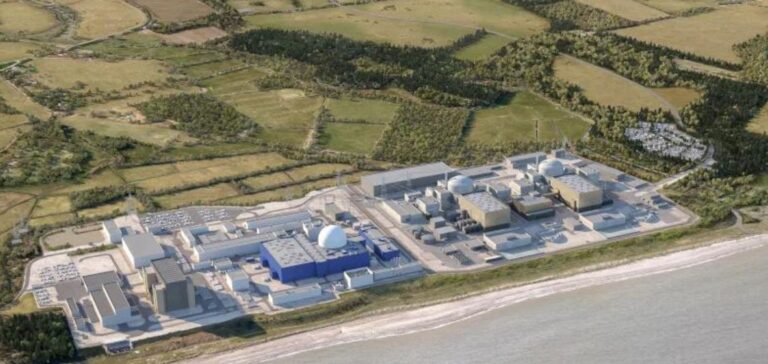The British government is presenting a £5.5 billion subsidy plan to support the Sizewell C nuclear power station construction project, led by EDF (Électricité de France) in Suffolk, England.
The grant, known as the “Development Expenditure Scheme”, is intended to cover development expenditure until a final investment decision is taken, thus ensuring that preliminary work continues without interruption.
The UK sees Sizewell C as a key element in strengthening its energy security and diversifying its low-carbon energy sources.
Strategic support amid investor skepticism
Sizewell C, which is expected to generate enough electricity to power around 6 million homes, faces significant financing challenges.
Although the project is essential to replace aging power stations and meet the country’s future energy needs, it is struggling to attract private investors.
Cost overruns and delays at Hinkley Point C, another nuclear power plant under construction by EDF, have made investors cautious. Originally scheduled to come on stream in 2025, Hinkley Point C has seen its cost re-evaluated at between £31 and £34 billion (2015 prices) and its completion pushed back to 2029.
In the face of this reluctance, the UK government has already allocated £2.5 billion of public funding to the Sizewell C project. The additional 5.5 billion grant is intended to stabilize funding until other investors commit.
The UK’s Department for Energy Security and Net Zero (DESNZ) stresses that this initiative is essential to achieving the objectives of energy security and supporting the local economy through the creation of skilled jobs.
A final decision on financial viability and long-term commitment is expected by the end of the year.
Implications for the UK nuclear industry
If Sizewell C is built, it would be the second new nuclear power station to be built in the UK in over two decades, after Hinkley Point C.
The UK nuclear industry sees Sizewell C as a litmus test for the future of the sector.
The UK authorities and EDF claim that the project could be around 20% cheaper than Hinkley Point C, thanks to efficiencies in design and construction.
However, these potential savings have yet to be validated and depend on many factors, including stable material costs, regulations and financing conditions.
As the UK seeks to reposition itself in a rapidly changing energy world, it sees nuclear power as a means of compensating for the intermittency of renewable sources such as wind and solar.
The success or failure of Sizewell C is likely to influence the confidence of investors and policy-makers in the pursuit of other nuclear projects.
The ability of this project to attract new capital and stay within its announced budget will be crucial in defining the future development framework for new nuclear facilities.
Financing prospects and governance challenges
Financing for the Sizewell C project is based on a model that combines public and private capital.
This mixed approach is intended to share risk and guarantee the long-term feasibility of the infrastructure.
However, the weight of public investment in this large-scale project raises questions about public financial management and fiscal responsibility.
If private investors remain hesitant, the government may be forced to increase its support further, which could have significant political and budgetary implications.
The approval of this grant also reflects London’s determination to secure its energy supply to 2030 and beyond.
Current dependence on energy imports, particularly natural gas, and recent geopolitical shocks are prompting the government to further diversify its sources of supply.
Support for Sizewell C is therefore seen as a strategic step towards greater energy autonomy.
The future of Sizewell C remains uncertain, with several challenges to overcome, not least the mobilization of sufficient funds to move beyond the development phase.
The results of this project will have a significant impact not only on the future of nuclear power in the UK, but also on national energy strategy as a whole.






















